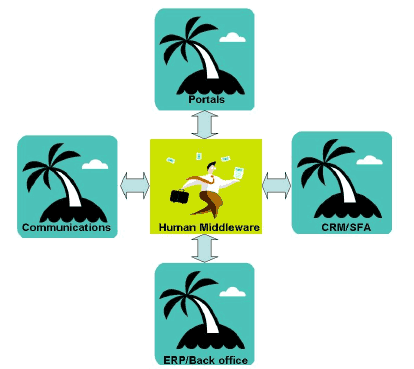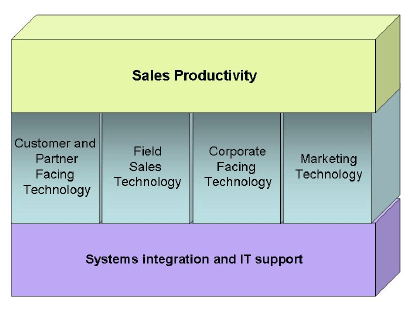
www.kickstartall.com
Sales Technology - Helping Sales Sell
Productivity and collaboration are the keys to sales technology adoption and success
by
Andrew Cadwell
The business benefits promised by sales technology can be elusive. Customer relationship management (CRM), sales force automation (SFA), enterprise resource planning (ERP), web portals, real-time communication, web sites, collaboration, presence, email, voice mail, unified messaging, mobile web, fax servers, wiki's, instant messaging (IM), personal data assistants (PDAs), tablets, projectors, Blackberries...raspberries!! As a sales professional, these sales technology tools are enough to make your head spin; as a CIO they're a nightmare scenario of independent "open" systems that make supporting organizational technology a constant uphill battle. As a sales VP or CEO you must ask yourself when technology becomes a burden rather than a benefit.
Figuring out which technologies are relevant is a major challenge. Countless time, effort, and monies have been poured into technologies on the premise that they would "help sales" and "help close business" only to find that they often create inefficiencies in productivity by poor adoption by sales people or by creating the condition that we call "human middleware" where human resources within the company are diverted to cross- feed information into different systems that aren't fully integrated or "islands of technology." Human middleware can be especially dangerous to revenue if those individuals are also sales organization resources that could be selling rather than doing data management functions.

Using technology for sales effectiveness and decreasing reliance on "human middleware" requires planning with more holistic focus than simply installing a "CRM" application. Although CRM technologies alone can undoubtedly act as enablers, true sales effectiveness requires companies to think more broadly with regards to the business, organizational, and human issues surrounding sales and to put technology to work in support of these issues. As time goes on and solutions become more complex, sales functions increasingly are becoming a team sport rather than an individual effort. Disappearing are the days of the sales "Lone Ranger." Enter the era of teamwork and collaboration to close that deal. These selling teams are comprised of many different individuals and functions including sales, operations, executive, engineering, business partners and even the customer. Sales technology should emphasize ease of collaboration as well as capturing leads, reporting activities, and forecasting revenue.
Categorizing Sales Technology
When thinking about sales technology as an enabler, it is helpful to categorize technology differently to avoid pitfalls. Rather than categorizing sales technology in typical ways such as software, hardware, infrastructure, etc., instead categorize technology more holistically to align with the sales functions and the IT organization's ability to support it. A holistic look at sales technology is divided into four categories:
Customer and partner facing technologies are your front line tools that facilitate communication and collaboration. These technologies are used to enable messaging to your customers and partners about who you are and what you offer as an organization. They also help you to collaborate with your customers real-time. These tools sell for you 24 hours a day, from anywhere in the world. As such, information should be readily available and tools should be reliable, but consider that these tools should also capture information about your customer and their preferences. Examples: Portals, websites, collaboration tools, Web meetings, conference solutions, etc.
Field sales technologies are the tools that facilitate efficiency and productivity that your front line uses every day to track progress and communicate. Sales people care about productivity and reducing or automating administrative tasks so that they have more time to communicate effectively with the customer. Field sales technologies should be selected to accomplish these tasks. A feature rich CRM program may look like a great reporting tool to executive management, but if it is too complex to use, sales people either wont use it, or it will impact their performance. Examples: PDAs, c ell-phones, laptops and tablets, collaboration tools, CRM, VPN solutions, productivity e-mail software.
Corporate facing technologies facilitate bilateral communication by interfacing your sales organization with the rest of the company. They are the touch points between sales functions and operations functions and are usually the least friendly to the individual contributor and typically shoulder most of the blame for productivity distraction. Human middleware is usually most apparent in corporate facing technologies because often, the solutions either aren't fully deployed, aren't fully integrated or have been mis-configured. When these tools aren't fully integrated or are incorrectly deployed, efficiencies are lost and productivity does indeed suffer. Examples: CRM, SFA, ERP, internal portals for training, announcements, etc.
Marketing technologies link Marketing to Sales, facilitate front end pipeline activity, assist to create demand and ideally, pass that information seamlessly into the sales organization. Field marketing typically shares many tools with the sales organization, but typically at the front end or the back end of the transaction. An example is marketing's use of CRM. Marketing may load trade show leads or call campaign leads into CRM for the sales team follow up. Then, after a sale is closed, marketing may go back with a customer satisfaction program. There are many other types of technologies, tools and strategies to create demand, but most importantly marketing technologies should facilitate collaboration and alignment with the Sales organization, and that collaboration process should be formalized, structured and encapsulated in the systems that they share. Examples: CRM, mail-merge, search optimization, targeted web advertising, war-dialing.

Write Your Sales Technology Plan
Many decisions you make about your sales technology, such as the choice of hardware and software tools, are likely to be costly or cumbersome to change later. When outlining your technology plan, consider the following:
- Keep in mind how the sales organization might grow or change.
- Evaluate and consider the tools that have been adopted and are in use in the field even if they aren't currently supported. If salespeople are using a tool, it likely has increased their productivity.
- Try to choose technology that is flexible enough to grow and change with you.
- As much as possible, choose technology that, while meeting your needs, is simpler rather than overly complex. All those extra "features" may just make your technology (whether it be a software program or a telephone) harder to use.
- Minimize human middleware. Make sure the systems can be configured and supported to pass information back and forth easily.
- Target specifically the needs of the salesperson and the selling process, rather than the perspectives of operations, IT, management or marketing.
Sales technology will continue to become more and more feature rich and consequently more and more complex. Keeping the perspective that the purpose of sales technology is to act as a productivity aid is critical to sales force adoption, and will help to realize the business benefits that are promised by sales technology in the enterprise.
About the Author
Andrew Cadwell is a new member of KickStart Alliance and a successful entrepreneur and former sales and operations executive specializing in initiatives and process that rapidly accelerate revenue and operational profit. He specializes in business development, sales/sales operations and professional services management. Seeking ways to differentiate and capitalize, optimize and rapidly enhance an organization's messaging, sales, delivery and success has been Andrew's mission his entire career. To assist with accelerating your team's growth or any other aspect of sales, sales operations, or business development you can contact Andrew at andyc@kickstartall.com.